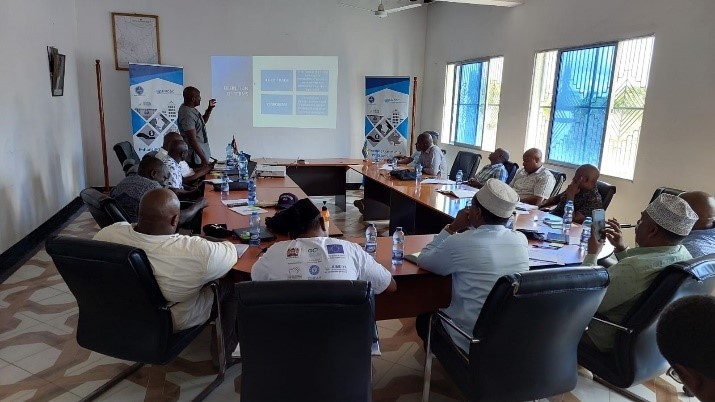UNODC Eastern Africa News and Stories
You are here: Home / News
Enhancing Coordinated Management of the Kenya-Somalia Border

Kenya, 27 March 2023 – Led by the Government of Kenya, UNODC supported the development of the Roadmap for Enhanced Inter-Agency Cooperation to Combat Illicit Trade and its Effects along the Kenya-Somalia Border, thanks to funding from the Kingdom of Denmark. The roadmap sets out a clear framework to strengthen inter-agency coordination towards the realization of five focus areas, each covering Kenya’s maritime, land, and air borders with Somalia.
Adopting a whole-of-government approach, the UNODC Global Maritime Crime Programme partnered with 23 government agencies – each with a key role in countering illicit trade – to identify immediate local priorities. In September 2022, Kenya’s Border Control and Operations Coordination Committee endorsed the roadmap, which carries national relevance as the government embarks on its phased re-opening of target points of entry along the Kenya-Somalia border. For Mr. Jimmy Wafula, Assistant Secretary of the Border Management Secretariat, the roadmap “is designed to leverage on existing governance structures at both the national and local levels by enhancing cooperation and collaboration among border agencies in their efforts to not only curb illicit trade but most importantly to secure Kenya’s border with Somalia.”
After the roadmap’s endorsement, UNODC and its partners started translating it into reality by sensitizing community leaders to the social consequences of illicit maritime trade, including the health, security, and economic harms. A sensitization course was developed by the 23 agencies involved in the roadmap and subsequently delivered to leaders in Lamu – a coastal city that borders Somalia – by representatives of the Border Management Secretariat, the Kenya Bureau of Standards, and the Kenya Ports Authority with UNODC’s support. Following the course, community leaders facilitated barazas (local town halls) to raise public awareness of legitimate trade and encourage the use of gazetted points of entry.
 To further implement the roadmap, UNODC continues to enable officers from the Kenya Coast Guard Service (KCGS), who received a train-the-trainer certification from the Danish National Police, to deliver courses to border officers on information sharing and management for maritime operations. In Lamu, KCGS instructors trained officers from the multi-agency Border Management Committee. Of the officers who participated in the course, 98% reported that the aims of the course were achieved, most of whom requested follow-up training on information analysis and validation in a multi-agency context. KCGS instructor Ms. Ann Njeri explained, “The training creates mutual understanding and trust in officers from multiple agencies to support the flow of information and enhance responses to maritime crime.”
To further implement the roadmap, UNODC continues to enable officers from the Kenya Coast Guard Service (KCGS), who received a train-the-trainer certification from the Danish National Police, to deliver courses to border officers on information sharing and management for maritime operations. In Lamu, KCGS instructors trained officers from the multi-agency Border Management Committee. Of the officers who participated in the course, 98% reported that the aims of the course were achieved, most of whom requested follow-up training on information analysis and validation in a multi-agency context. KCGS instructor Ms. Ann Njeri explained, “The training creates mutual understanding and trust in officers from multiple agencies to support the flow of information and enhance responses to maritime crime.”
Looking ahead, UNODC stands ready to continue its support for inter-agency cooperation to combat illicit trade along the Kenya-Somalia border. “The UNODC Global Maritime Crime Programme is grateful to the Kingdom of Denmark for its financial support in advancing border governance and welcomes additional partnerships with Member States to able to continue to action requests from the Government of Kenya to build stronger border security,” said Mr. David O’Connell of UNODC.
For more information, please contact:
Mr. David O’Connell (David.OConnell@un.org)
Western Indian Ocean Programme Coordinator
Global Maritime Crime Programme
United Nations Office on Drugs and Crime
Click here to visit the UNODC Global Maritime Crime Programme website.